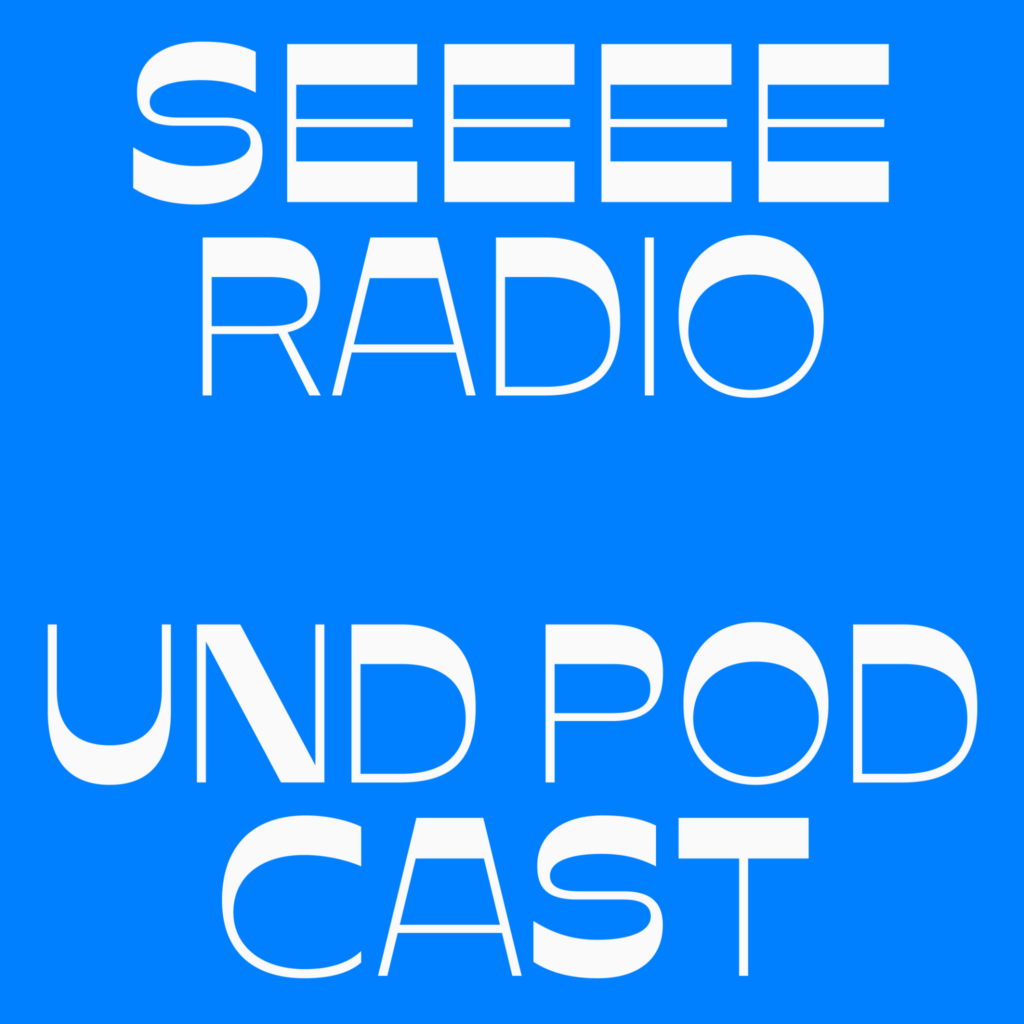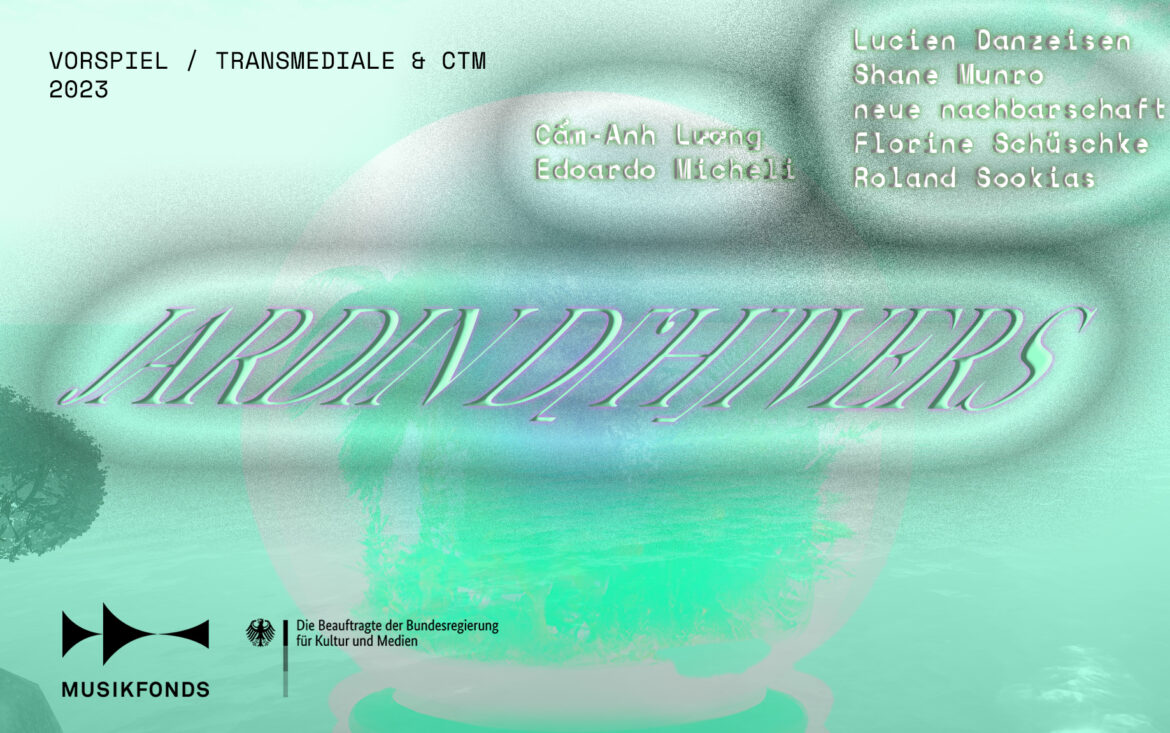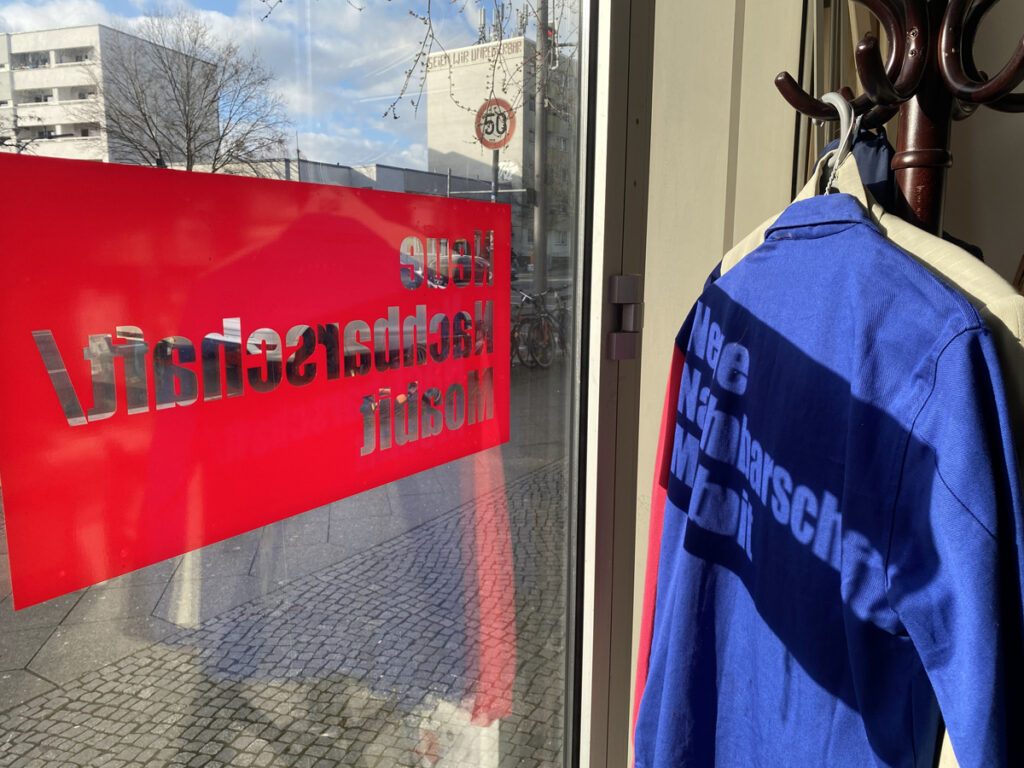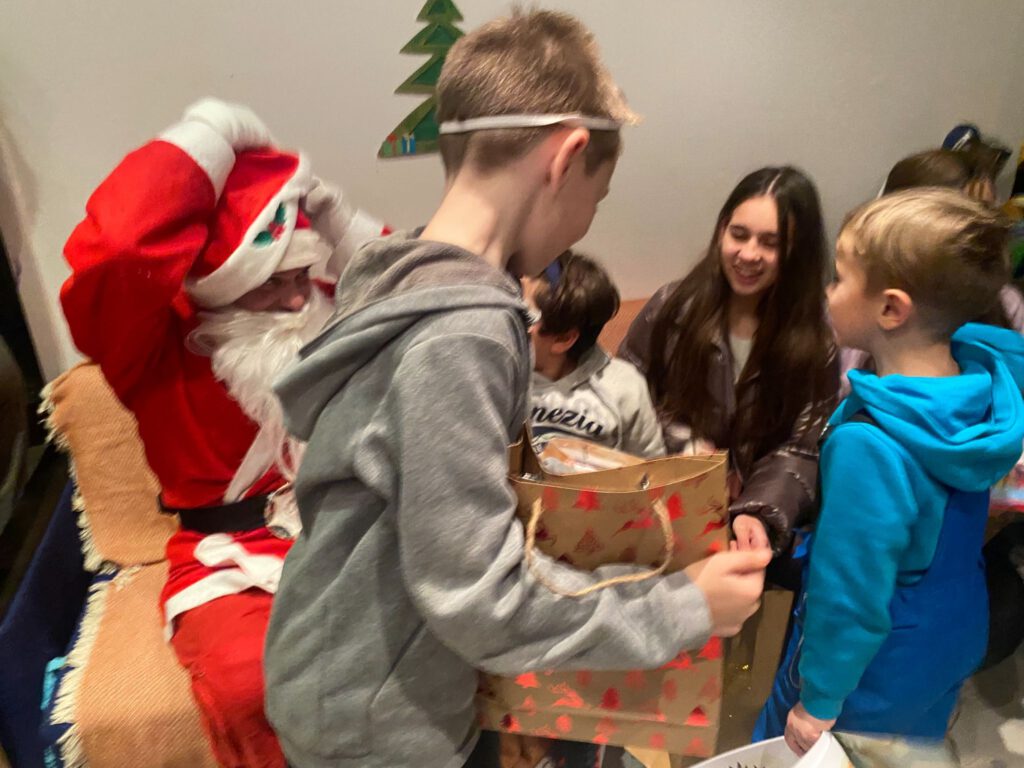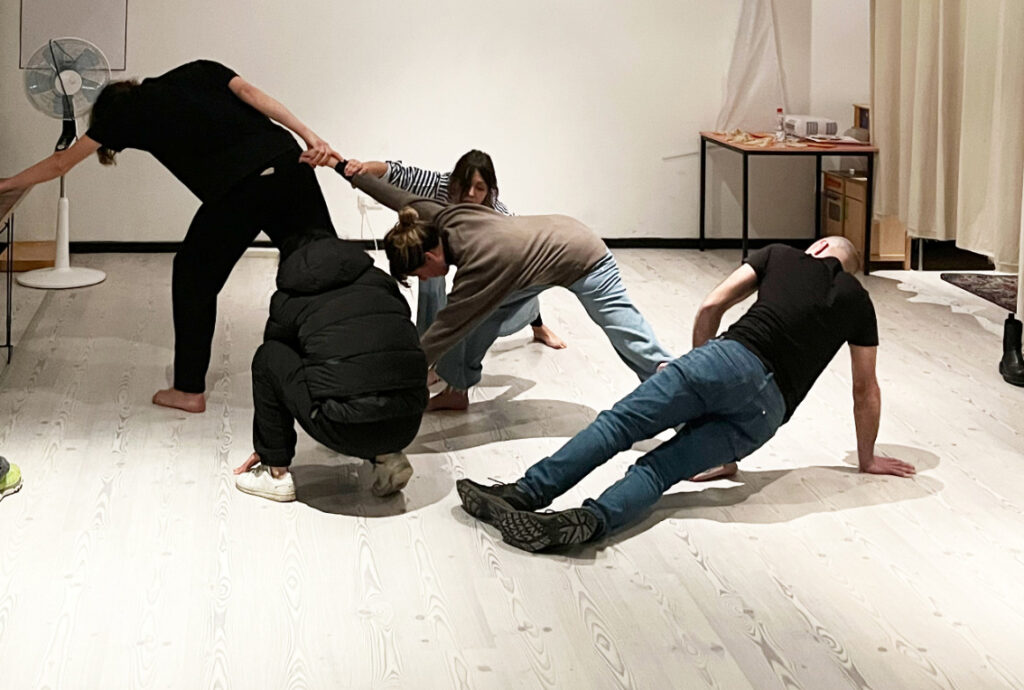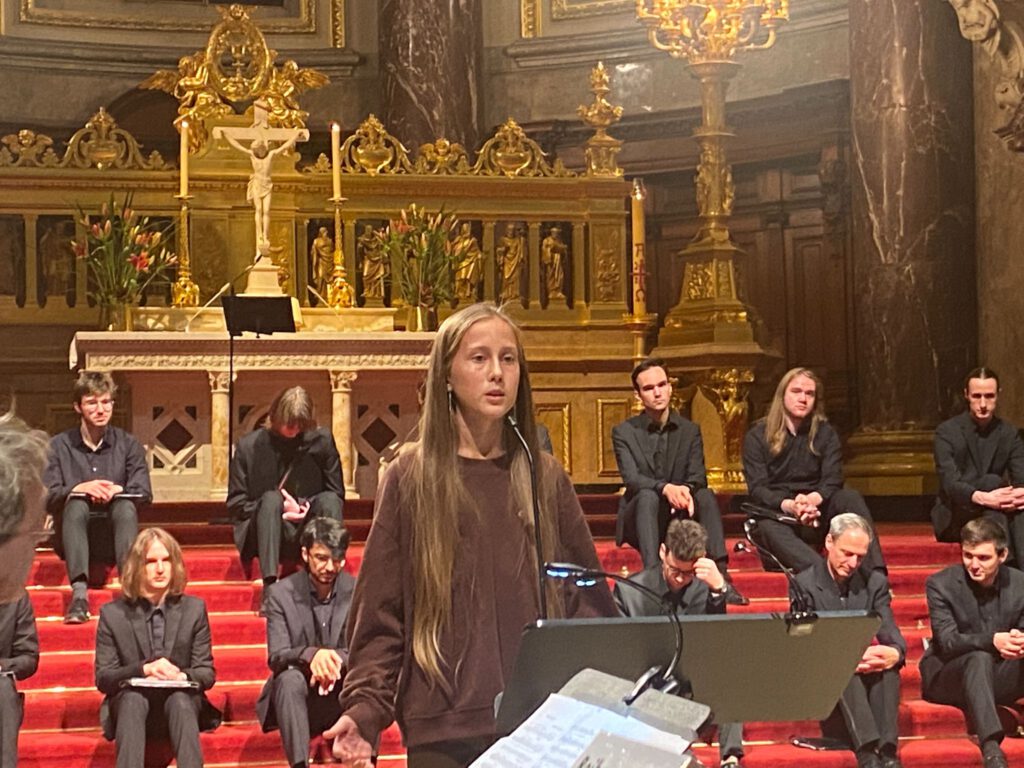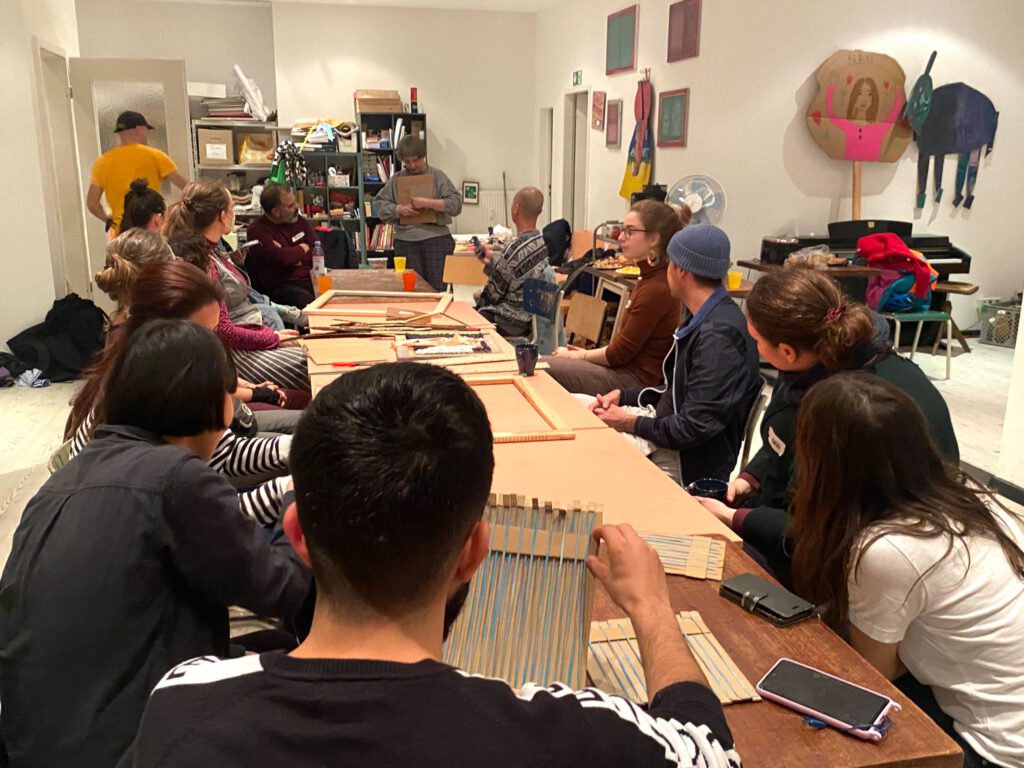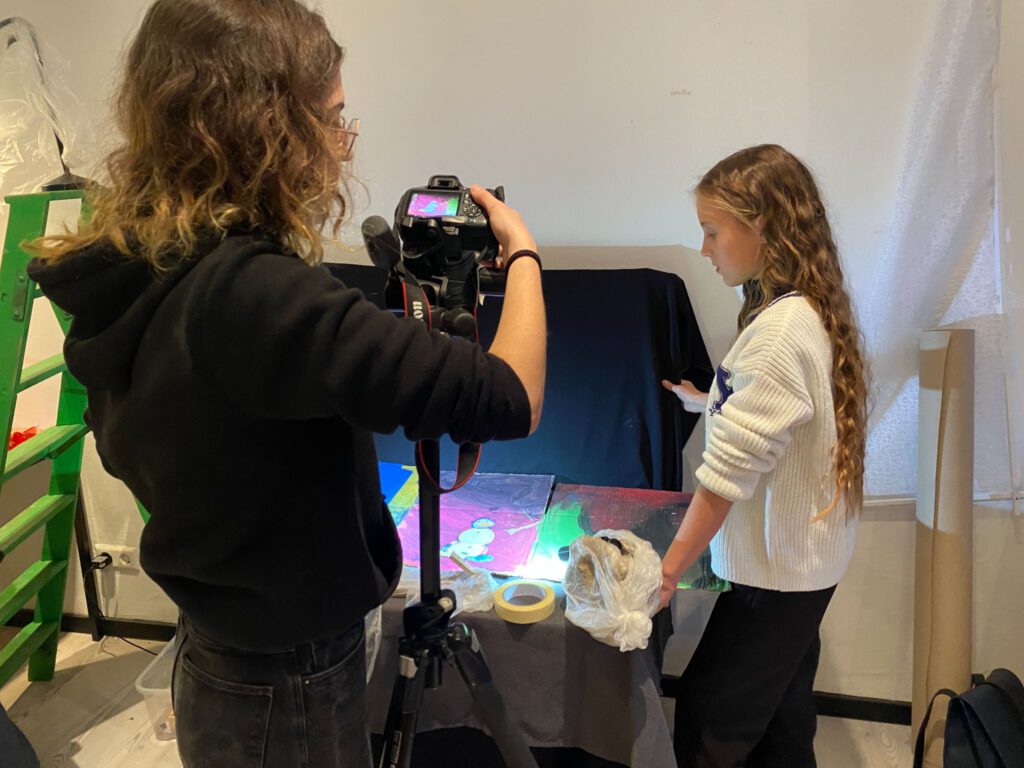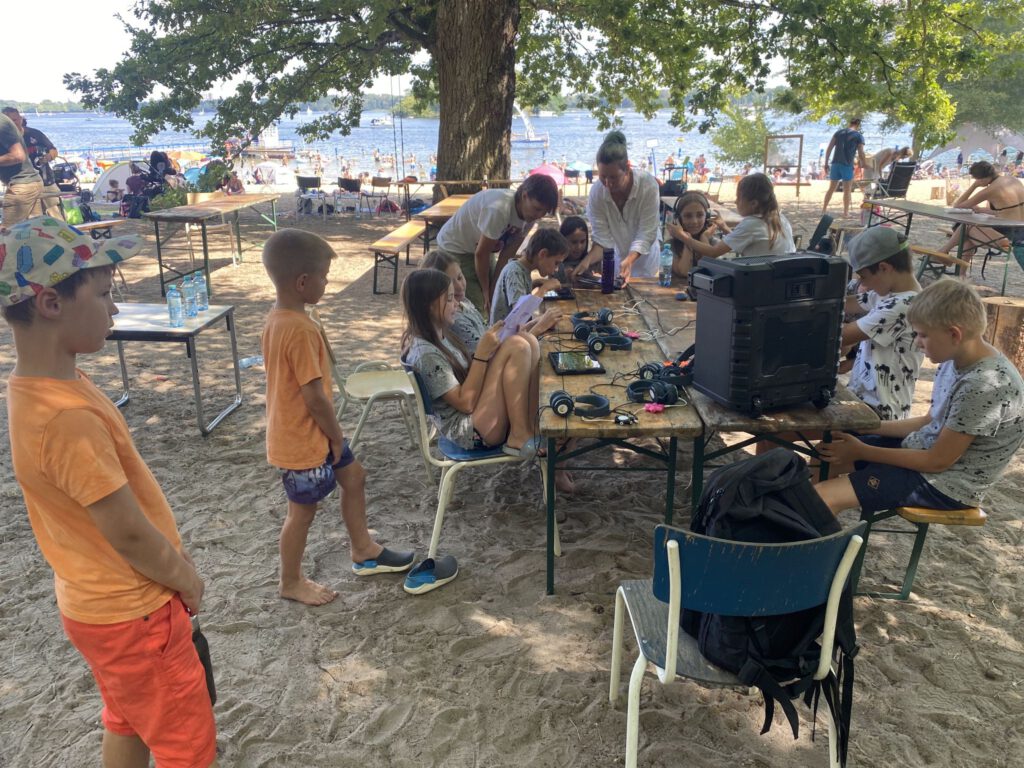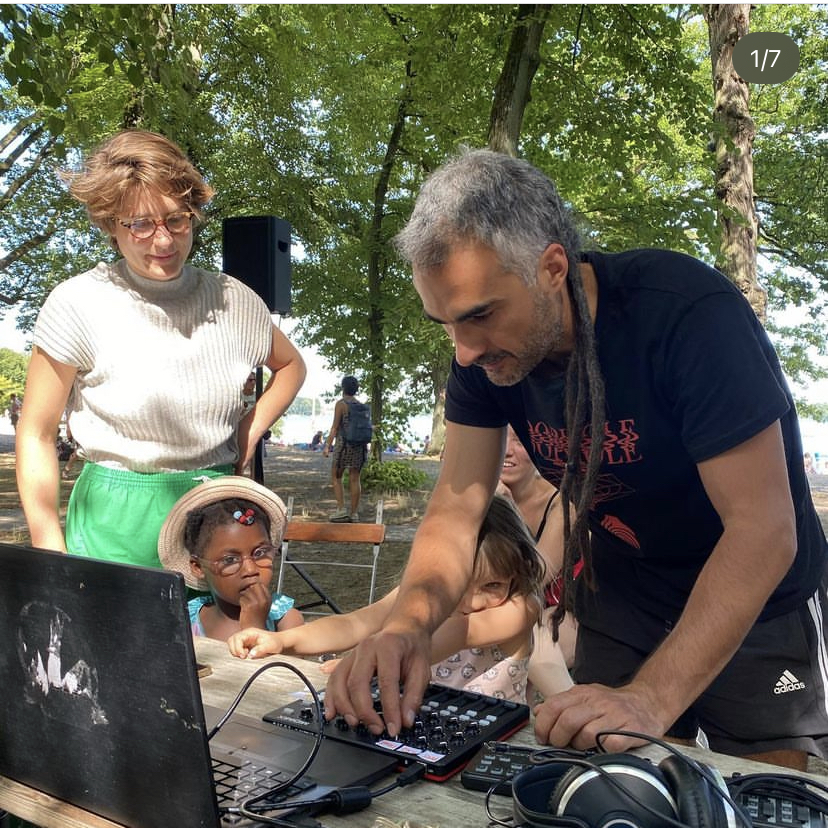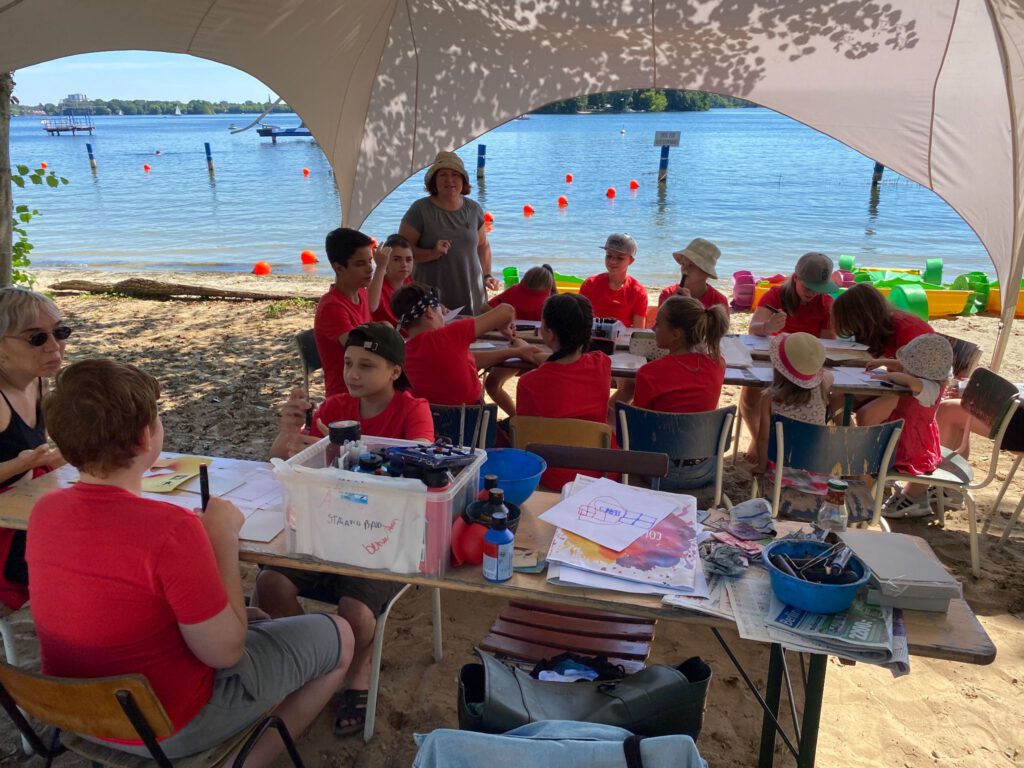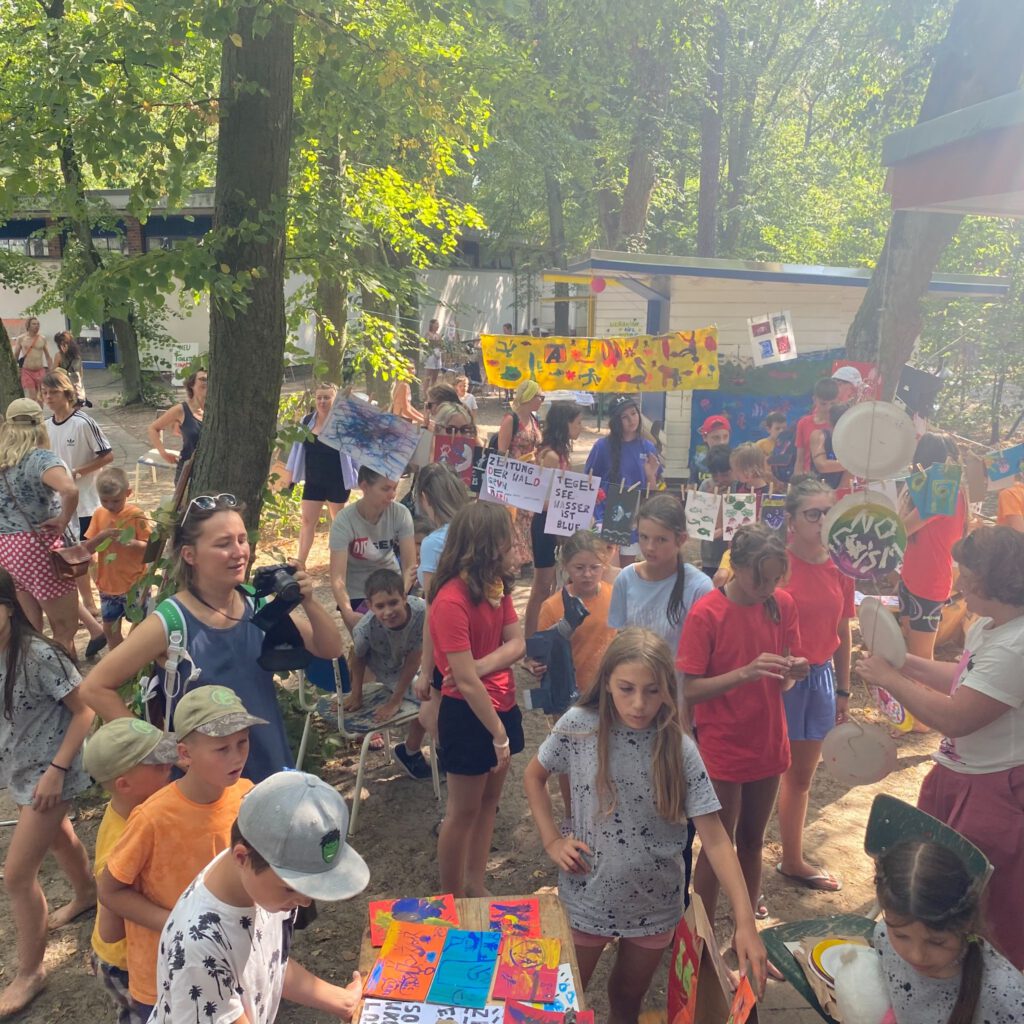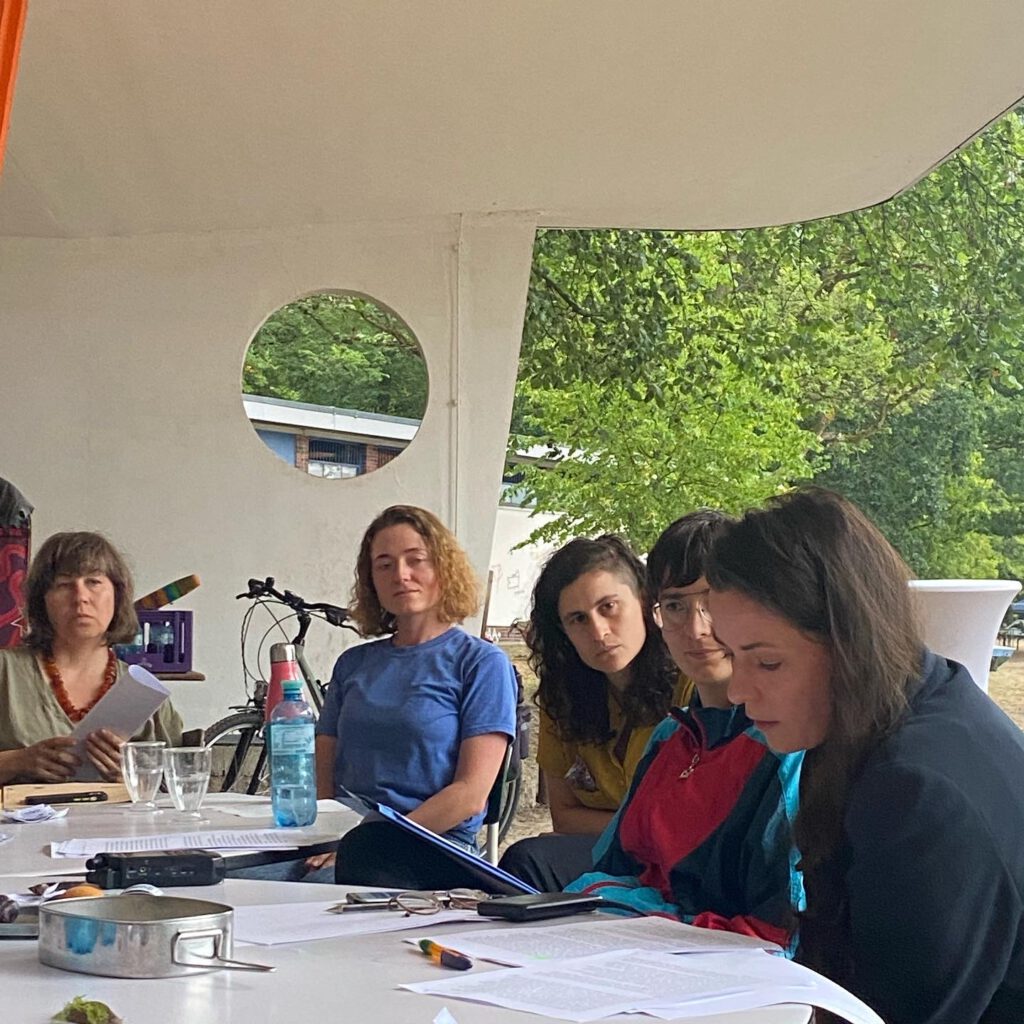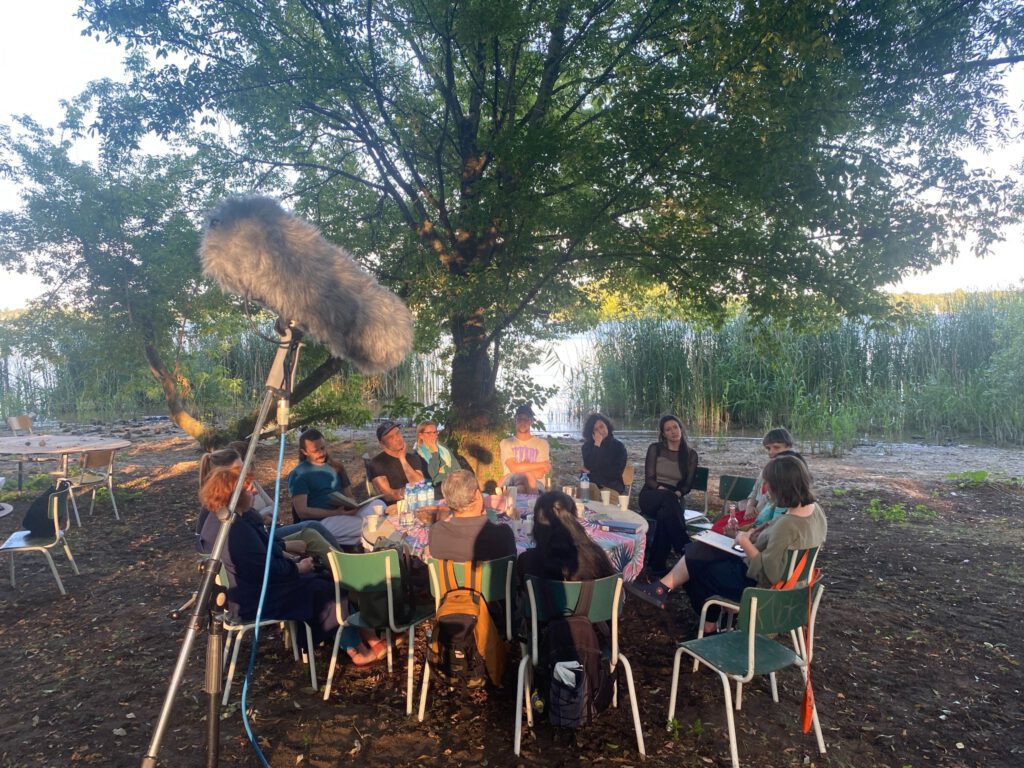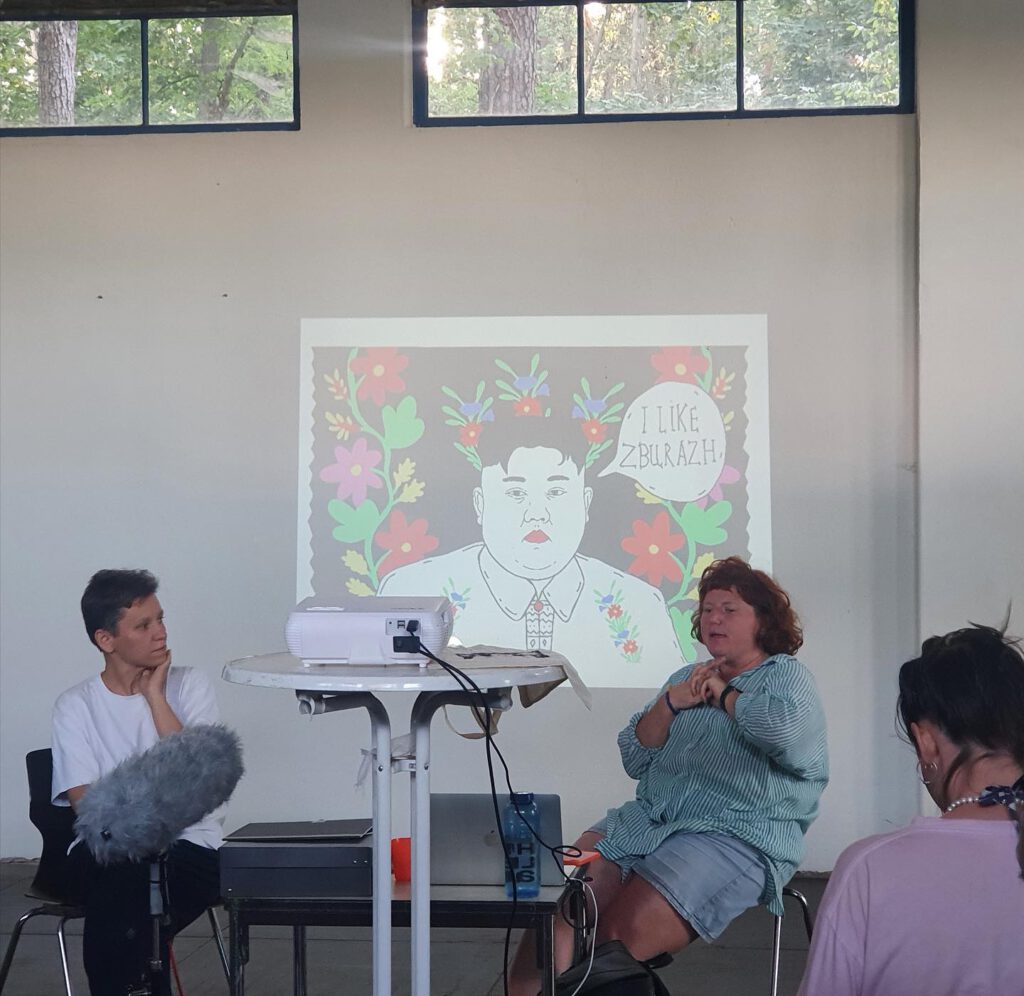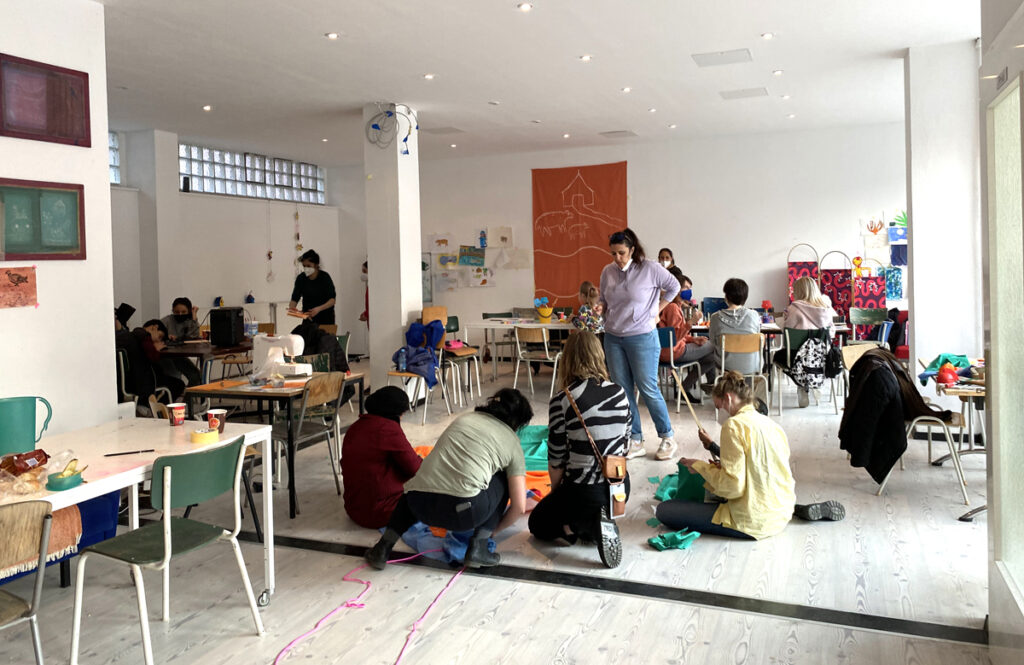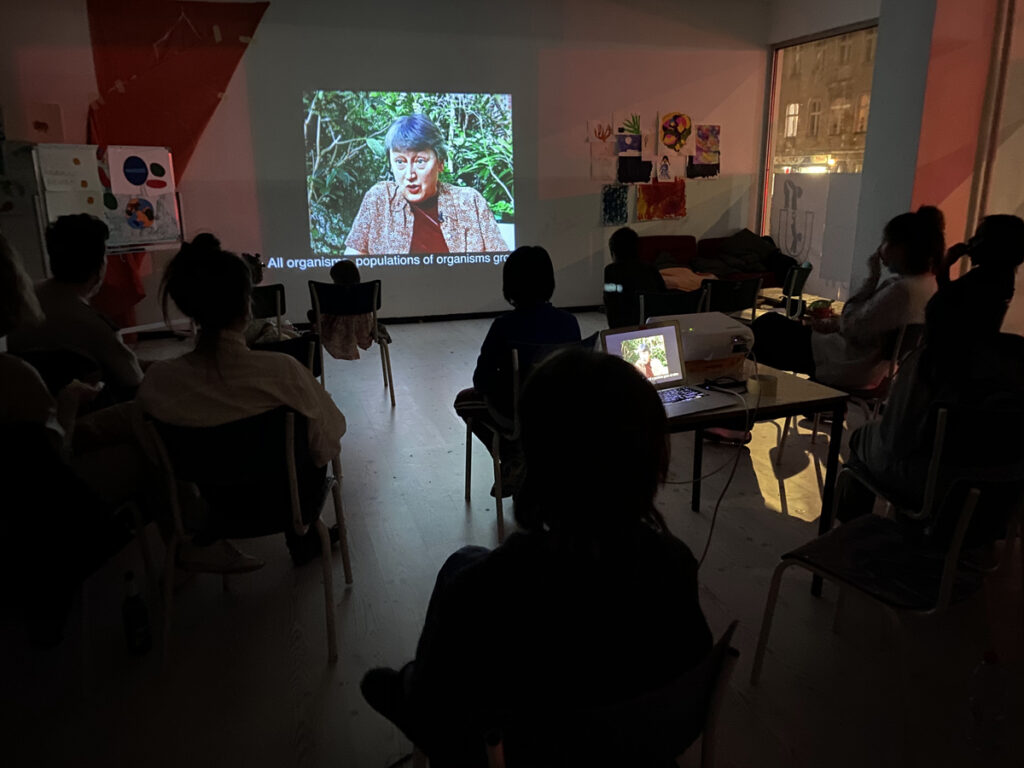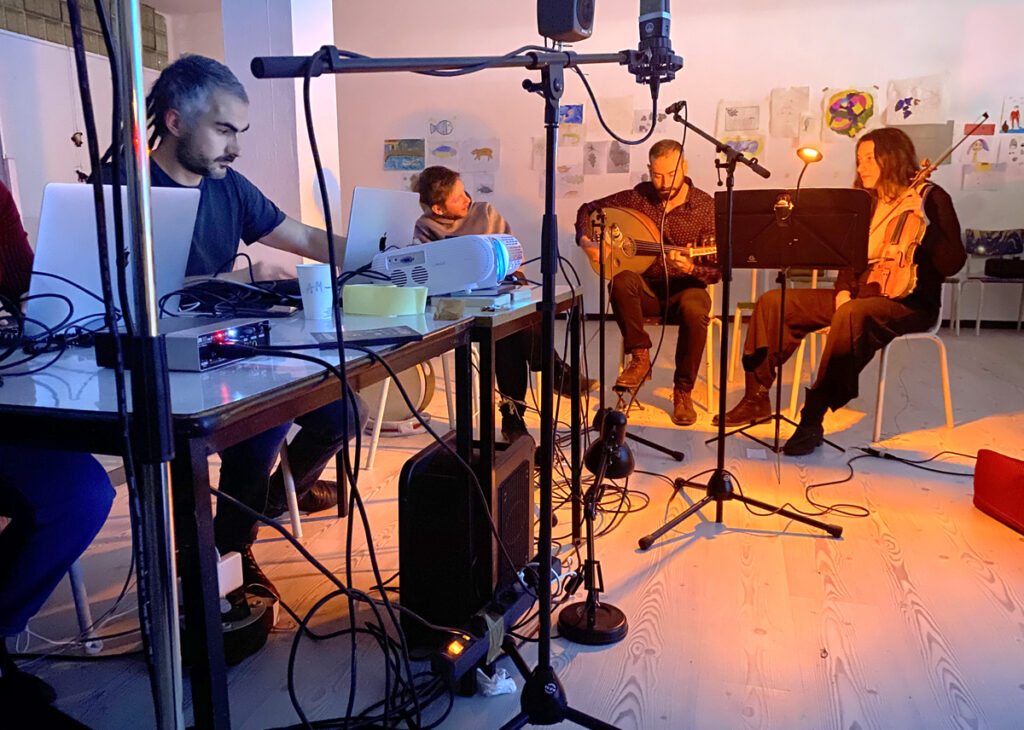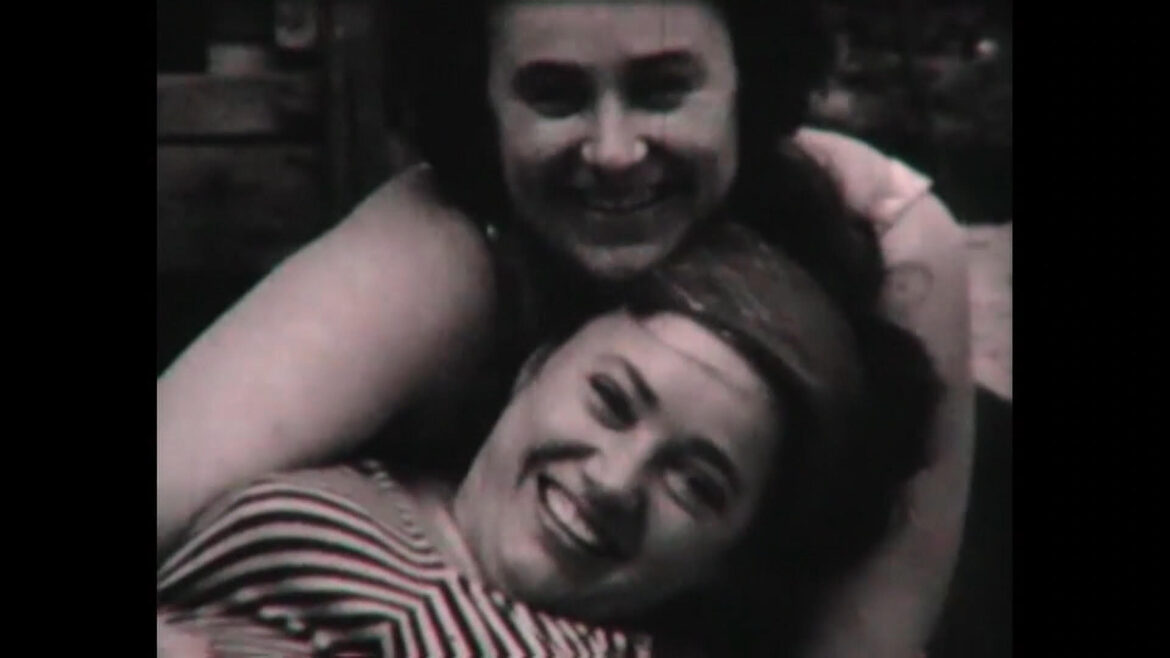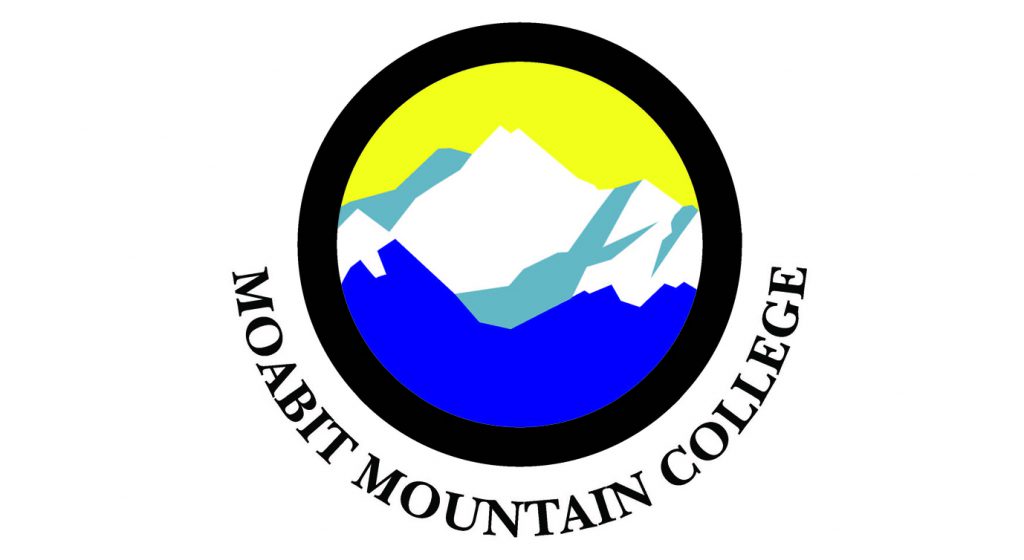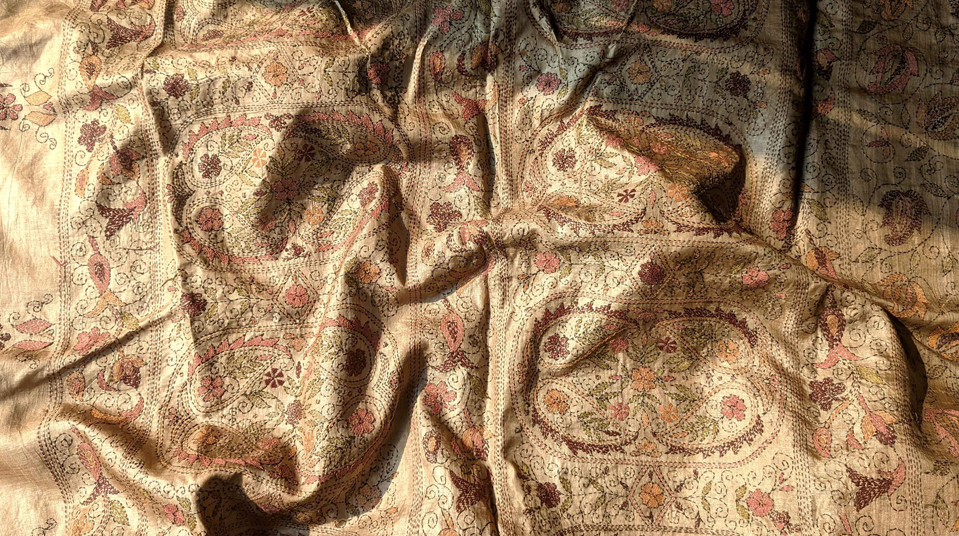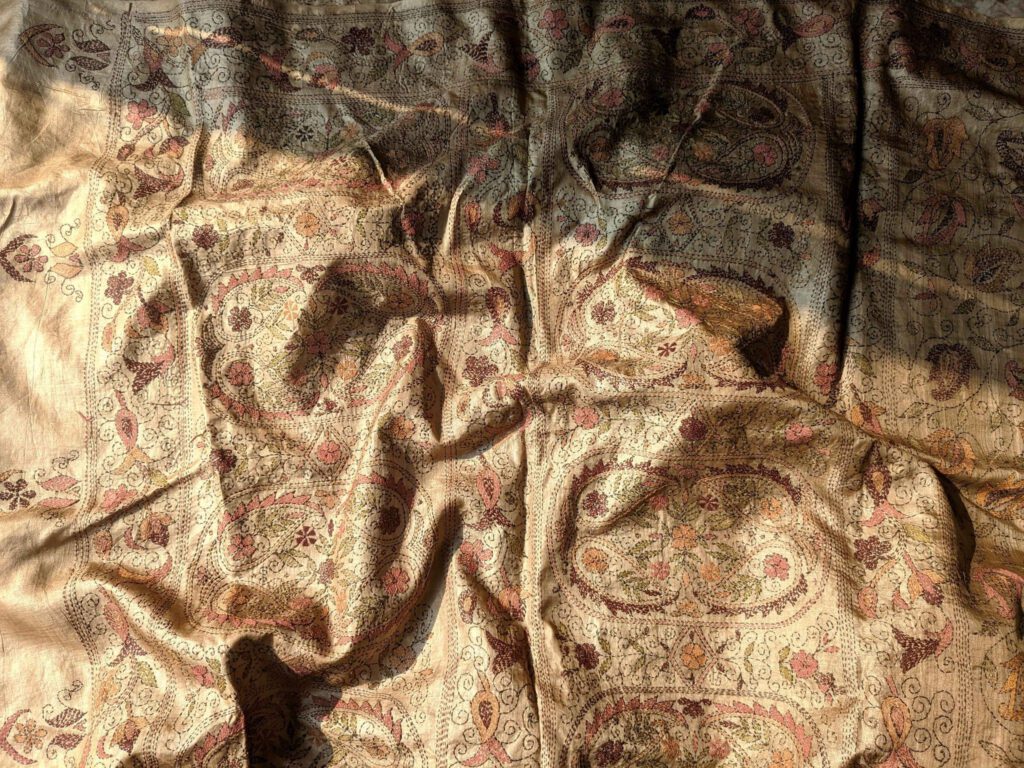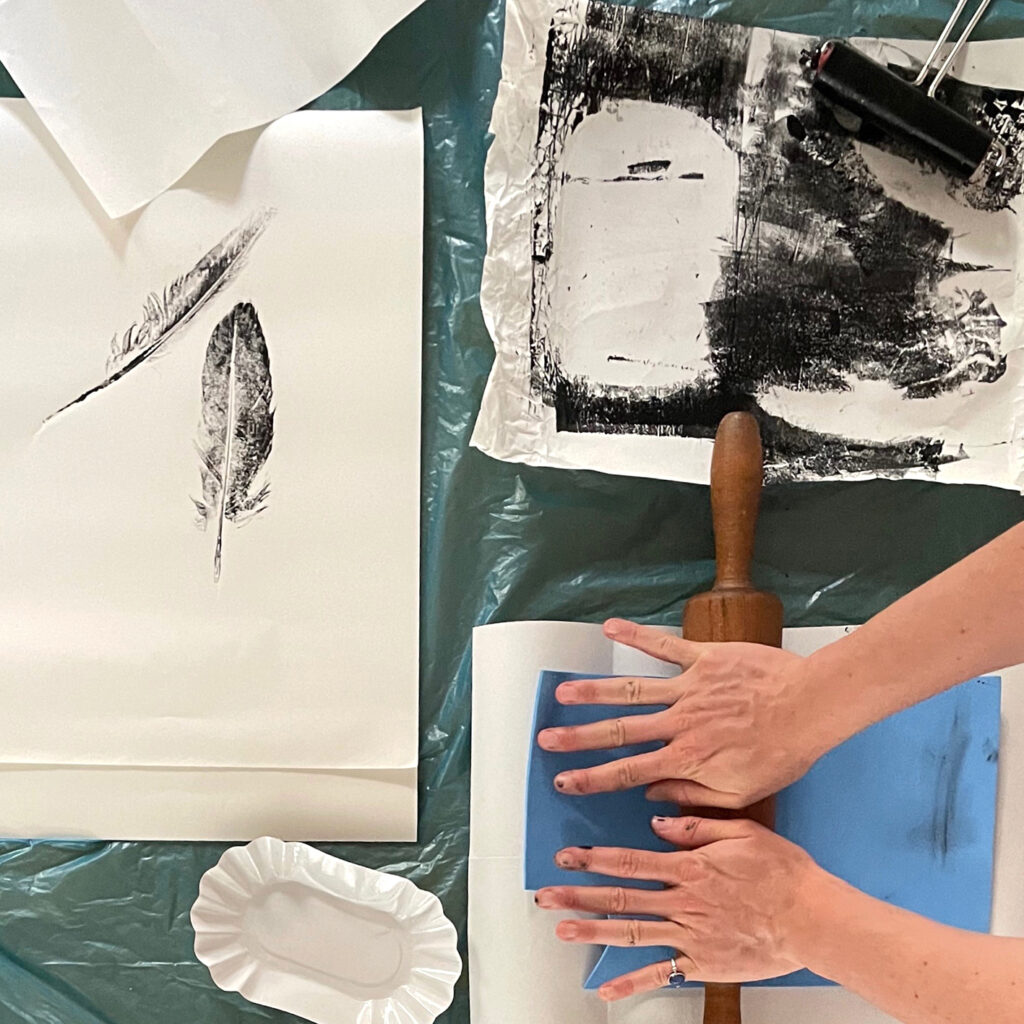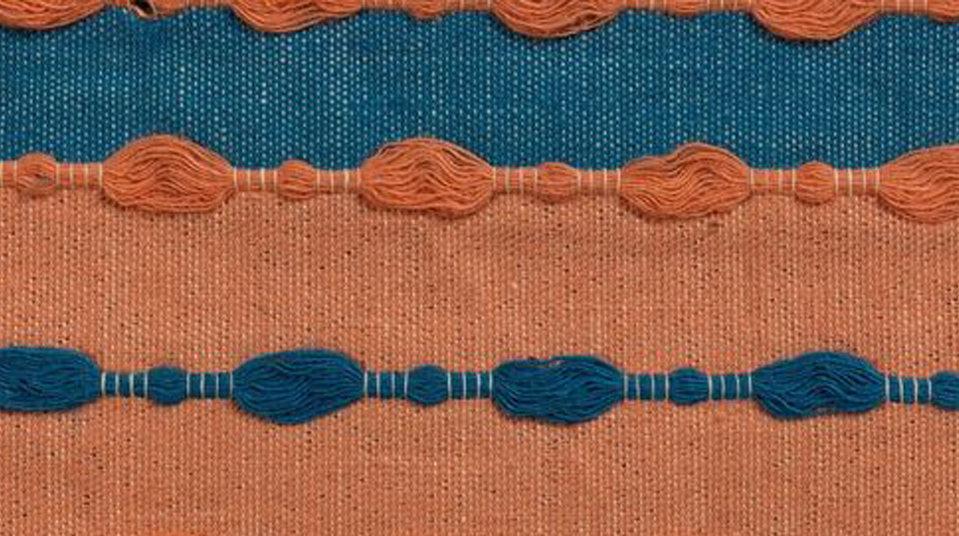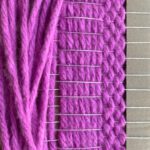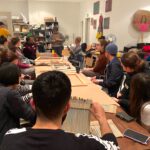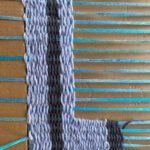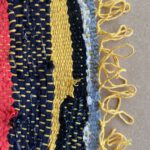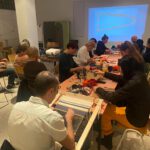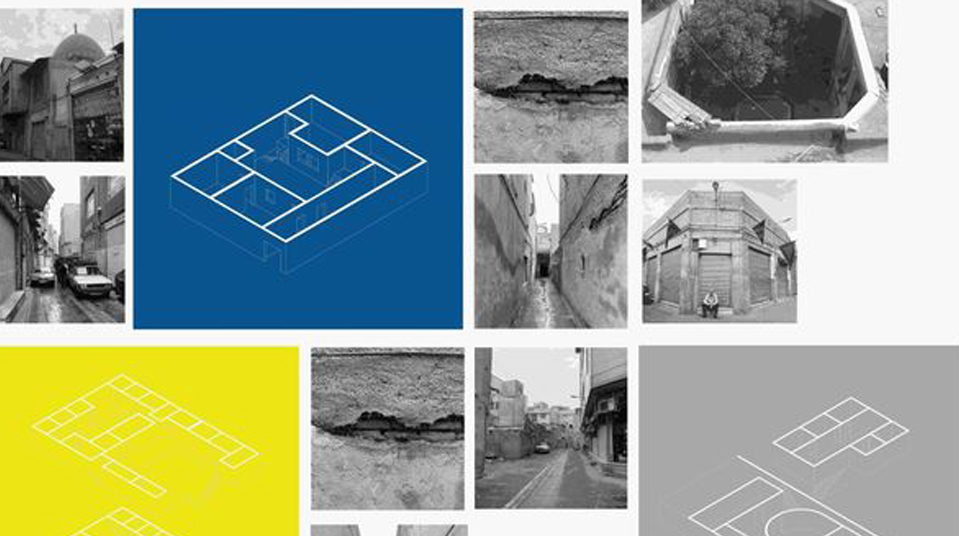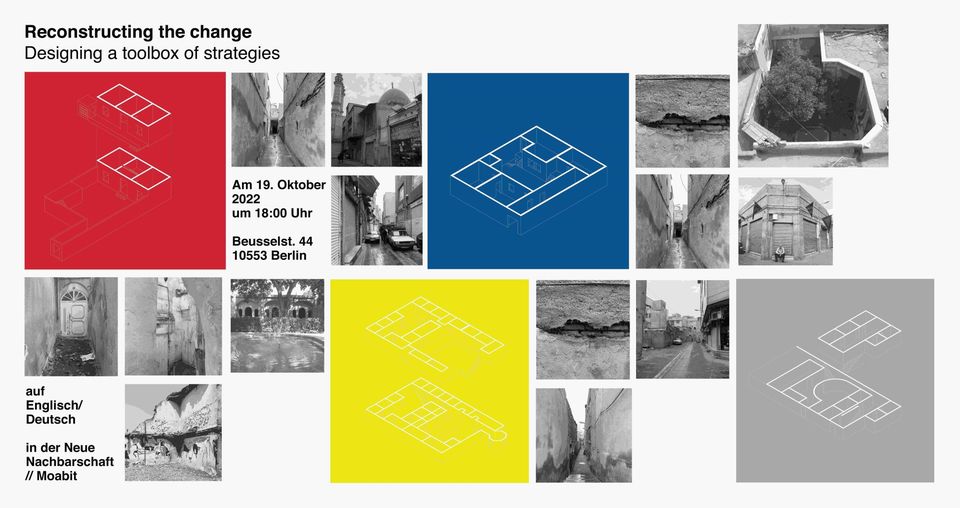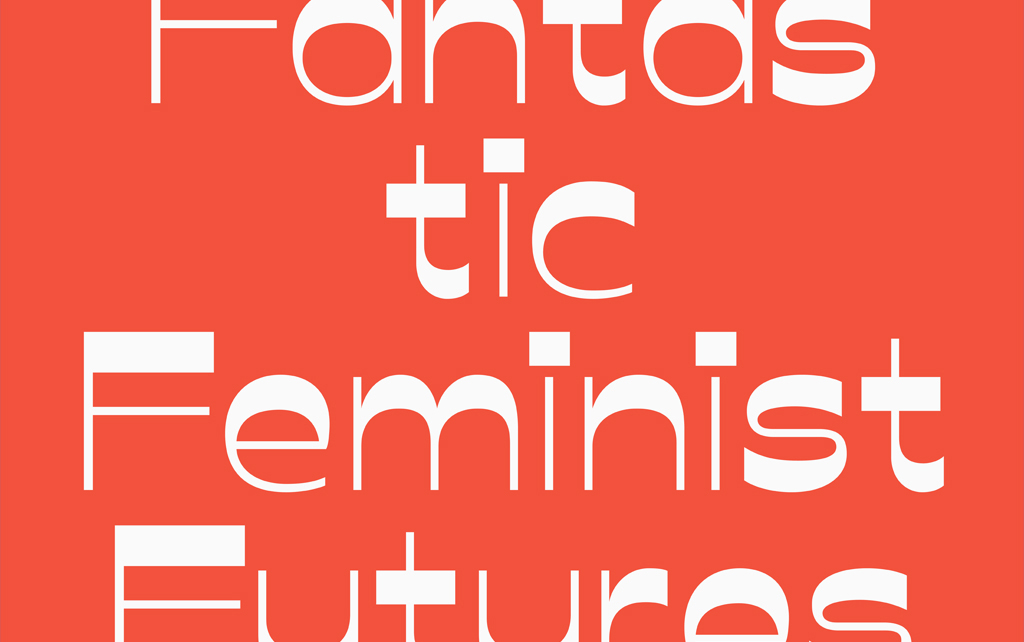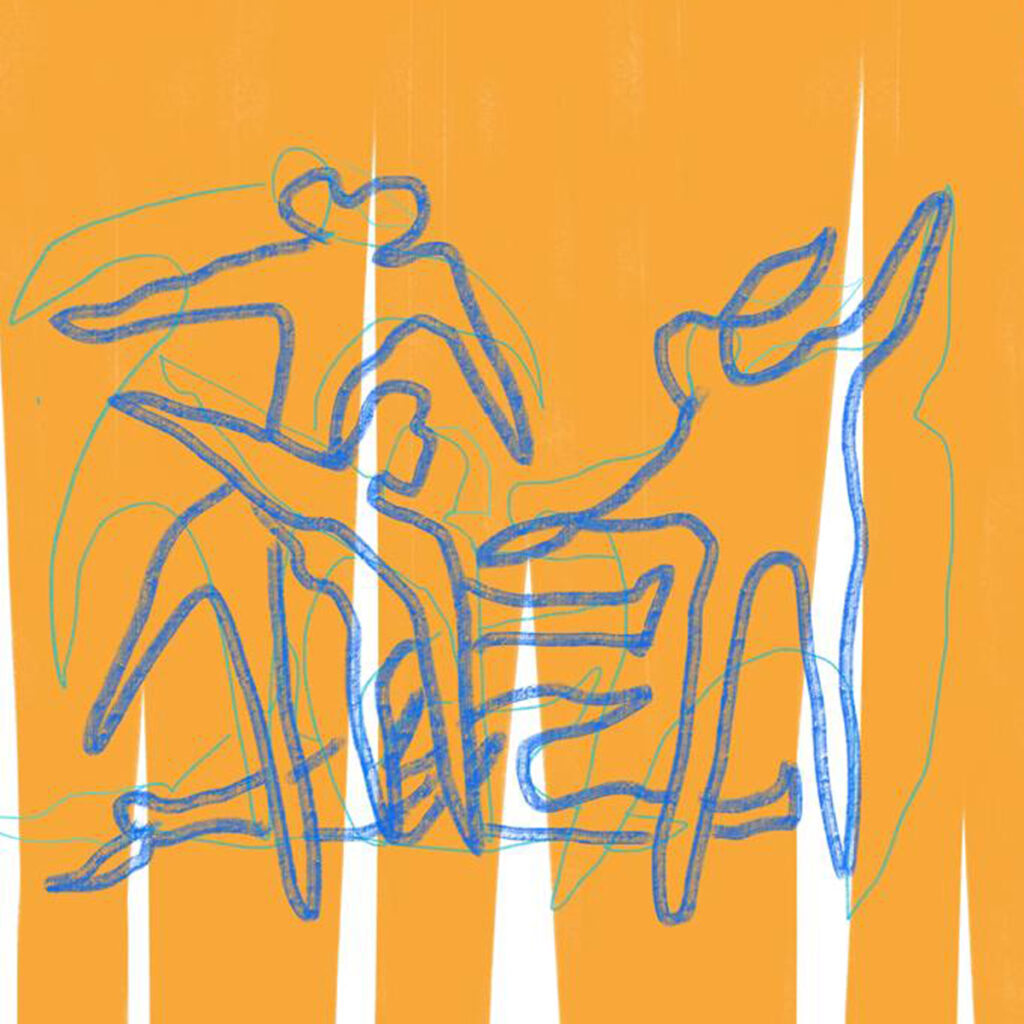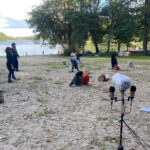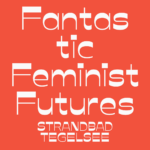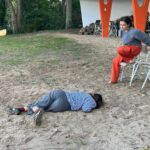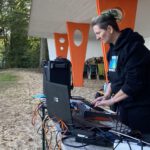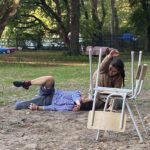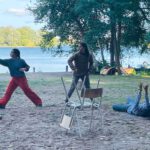seeeePodcast / Zwei Lerngemeinschaften: Živi Atelje DK und Hand Weaving & Observing Eye (MMC)
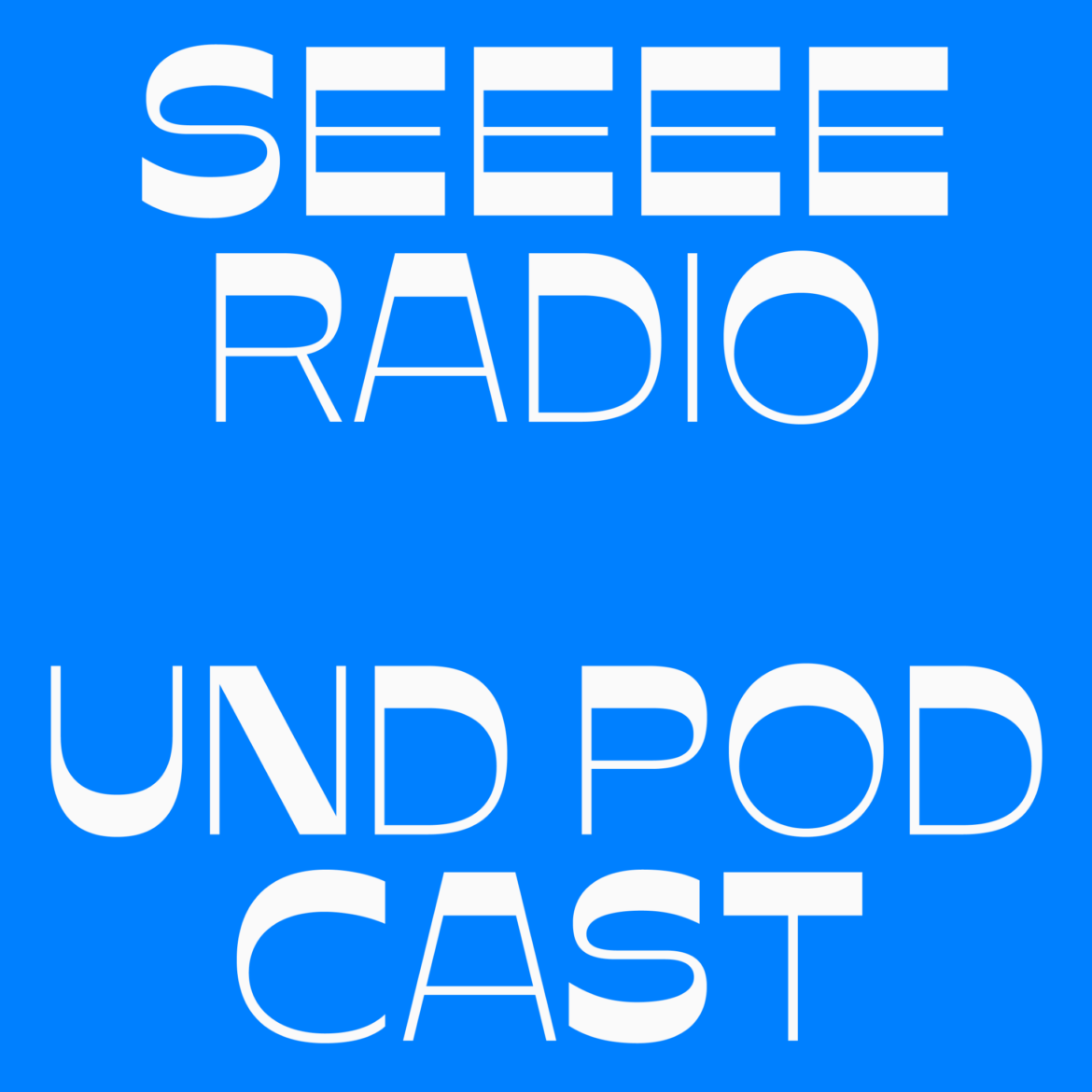
Zwei Lerngemeinschaften: Živi Atelje DK und Hand Weaving & Observing Eye
(english version is below)
In zwei Sessions, einmal vor Ort in der Neuen Nachbarschaft/ Moabit und das zweite Mal in einem Online-Meeting, tauschten wir uns über die Erfahrungen zweier Initiativen aus: das erste Hand Weaving & Observing Eye am Moabit Mountain College in Berlin gegründet und das zweite Živi Atelje DK (Living Atelier DK) in Zagreb.
Die Grundidee des Kollektivs Hand Weaving ist die Erforschung sozialer Bindungen: Durch die Arbeit mit Textilien und der Materialität des Webens als solches, seiner Dauer, der Zeit, die benötigt wird, um Wissen und Vertrauen zu gewinnen, Verständnis für das Material und Verantwortung für den Werkstoff, konzentriert sich das Kollektiv auf den Aufbau sozialer Bindungen und möglicher Transformationen. Das Živi Atelje DK wurde im Atelier der Bildhauerin Vera Dajht Kralj eingerichtet und dient als Treffpunkt für Menschen unterschiedlicher Herkunft. Eine sehr ähnliche Idee liegt auch der Neuen Nachbarschaft und ihrem Projekt Moabit Mountain College zugrunde. Die Erfahrungen beider Sessions wurden in Form von Podcast-Episoden für Seeee Radio aufgenommen, damit sie zirkulieren und verschiedene Communities erreichen können.
Im ersten Teil teilten die eingeladenen Künstlerinnen Marta Sala und Sveta Husakova ihre Verbundenheit mit dem Textil als Material mit. Sie stellten ihren formellen und informellen Bildungswege dar: Marta erklärte, wie ihr die Garmont Industrial School, die sie neben der Akademie der Schönen Künste absolvierte, einen spezifischen Blick auf das Textil, auf die Verantwortung gegenüber dem Material sowie auf die Handarbeit, die normalerweise von Frauen geleistet wird, gegeben hat. Sveta Husakova berichtete über ihre Erfahrungen in der Weberinnengemeinschaft in ländlichen Regionen von Belarus, die an Polen und die Ukraine grenzen: wie sie das Vertrauen der Gemeinschaft gewann, die Verbreitung von Wissen beobachtete.
Im zweiten Teil, der als Online-Session stattfand, zeichneten Cyrille Cartier und Saša Kralj nach, wie sie mit dem Vermächtnis der Keramikkünstlerin und Bildhauerin Vera Dajht Kralj arbeiten, die selbst Migrantin war und im Nachkriegs-Jugoslawien ein offenes Atelier leitete, das als sozialer Treffpunkt diente. Darauf aufbauend betreiben Cyrille und Saša einen Raum in Veras ehemaligem Studio als Living Atelier, in dem viele Initiativen und Klassen gegründet wurden und als Plattformen des Lernens und der Förderung dienen. Eines der vielen Kollektive im Živi Atelje DK setzt die Arbeit mit Keramik fort. Im Austausch mit Cyrille Cartier und Melike Bikec, einem der Mitglieder der Keramik-Klassen, haben wir uns mit Strategien des Community Buildings, mit Sprachpolitik, aber auch mit Herstellungsprozessen an sich beschäftigt.
Nicht nur Textilien erzählen plurale Geschichten!
Moderation: Agnieszka Kilian
Sound and Post-production: Biljana Pais
EN
Our new Podcast in the frame of the project communities of learning
Živi Atelje DK and Hand Weaving & Observing Eye (Moabit Mountain College)
During two sessions, one in Neue Nachbarschaft/ Moabit and a second as an on-line meeting, we shared experiences of two initiatives: one started at Moabit Mountain College in Berlin Hand Weaving & Observing Eye and the second run in Zagreb as Živi Atelje DK (Living Atelier DK).
The very founding idea of the Hand Weaving collective is the investigation of social ties: by working with textile and with materiality of weaving itself, its duration, the time needed to gain knowledge and trust, understanding of the material and responsibility toward the fabric, the collective focuses on the building of social connections and possible transformations. The Živi Atelje DK is an initiative established in the studio of the sculptor Vera Dajht Kralj and serves further as a place where people with different backgrounds can meet. The very similar idea underlies Neue Nachbarschaft and its project Moabit Mountain College. The experiences of the sessions were gathered in the form of podcast episodes for Seeee Radio, so they can circulate and reach out to different communities.
In the first part, invited artists Marta Sala and Sveta Husakova shared their attachment to the textile itself. They pictured their educational ways, both formal and informal: Marta explained how far the Garmont Industrial School she graduated from – along the Academy of Fine Arts – gave her a specific view on textile and the responsibility versus the fabric as well as the hand work done usually by women. Sveta Husakova shared her experiences of the research she made in the weaving community in rural Belarusian regions, nearby Poland and Ukraine: how she gained the trust of the community, observed the circulation of knowledge.
In the second part, during the on-line session, Cyrille Cartier and Saša Kralj pictured the way they work with the legacy of the studio of ceramic artists, sculptor Vera Dajht Kralj, who herself was an migrant and ran in postwar Yugoslavia an open studio, that served as a social hub. Drawing upon this attitude Cyrille and Saša, have been running the very space of Vera´s former studio as a Living Atelier, where many initiatives and classes have been started and are based as learning and support platforms. One of many collectives of Živi Atelje DK continues the work with ceramics. In the exchange we had with Cyrille Cartier and Melike Bikec, one of the members of the ceramic classes, we looked into the community building strategies, language policy, but also the making processes themselves.
Not only a textile is a plural narrative!
Podcast-Moderator: Agnieszka Kilian
Sound and Post-production: Biljana Pais
